1. 实义动词
实义动词是表示具体动作的词。常见的分类:及物动词和不及物动词。
1. 及物动词:后面直接加宾语,并且必须加宾语;
比如:I love you. I buy a book.
2. 不及物动词:后面不能直接加宾语,必须要加了介词以后才能加宾语;
比如:I agree with you. I live in Beijing.
如何区分及物动词和不及物动词呢?
1. 根据意思;
buy ; eat
2. “动词+ 介词”中的动词为不及物动词;
arrive at ; listen to ; look at
3. 看单词记忆;
V.:既可以作及物动词,也可以作不及物动词
Vt.:及物动词
Vi.:不及物动词
2. 系动词
状态:be动词
表象:seem, appear
保持:keep, stay, remain, stand
感官 : look, sound, taste, smell, feel
变化:get, become, turn, grow, fall
终止:prove
3. 情态动词
情态动词是本身有一定的词义、表示说话人主观态度的词。
情态动词不能单独出现,后面必须和实义动词/系动词(原型)一起构成谓语。

特殊用法:情态动词的完成时表示推测。
1. should have done : 本应该做某事;
2. could have done : 本可以做某事,却没做,表遗憾;
3. needn’t have done : 本无需做某事,却做了;
4. must have done : 一定做过某事;
举例: 明天就要考试了,但小明通宵玩了一晚的游戏。第二天一早匆匆忙忙读了一会儿语文,来到学校考场……
1. 老师刚刚发试卷,他就想睡觉,心里好后悔:我本该早点睡觉的;
I should have gone to bed early.
2. 看到考题好难,觉得好崩溃:我本来可以好好复习的;
I could have revised well.
3. 做着做着,他发现原来考的是数学,内心凌乱:我原不用看语文的;
I needn't have read Chinese.
4. 走出考场,看到同桌兴高采烈,小明想:他肯定努力学习了;
He must have studied hard.
4. 助动词
助动词就是帮助谓语动词一起构成否定、疑问、时态、语态等的词。

一般疑问句
1. He is Ming.
Is he Ming? Yes , he is / No ,he isn't
2. Ming plays basketball every day.
Does Ming play basketball every day? Yes ,he does / No, he doesn't
3. Ming can win the game.
Can Ming win the game? Yes , he can / No, he can't
4. Ming has had a book.
Has Ming had a book? Yes, he has / No, he hasn't
5. We will carve out a brilliant future if we study hard.
Will you carve out a brilliant future if you study hard? Yes, we will / No, we won't
※ 试试看:将下列句子改成一般疑问句,并做肯定和否定回答。
1. I speak English.
Do you speak English? Yes, I do / No, I don't
2. These are their friends.
Are these their friends? Yes, these are / No, these aren't
3. Mary should take part in the meeting.
Shoule Mary take part in the meeting? Yes , she should / No, she shouldn't
4. They will tell you the truth.
Will they tell you the truth? Yes, they will / No , they won't
5. We have passed the examination.
Have you passed the examination? Yes, we have / No, we haven't
总结:英语肯定句怎么改成一般疑问句?
1. 假如句子中有 be / 情态 / 助动词,直接提前。
2. 假如句子,只有实义动词,就要借助 do / does / did 放在句子前面,并将实义动词改成 原形,have / has 提前后面不用改原形。
3. 注意将句号改成问号。
4. 肯定回答: Yes, 主语人称代词 be / 情态 / 助动词 / do / does / did。
5. 否定回答: No, 主语人称代词 be / 情态 / 助动词 / do / does / did ,然后加 not 。
5. 练习题
1. 找出下列句子的谓语 并改成否定
1. I shall ask him to investigate the case.
I shall not ask him to investigate the case.
2. Mike often plays basketball with his friends.
Mike often doesn't play basketball with his friends.
3. Kids should rely on their parents.
Kids should not rely on their parents.
4. Nobody will help you.
Nobody will not help you.
5. She is going to the cinema.
She isn't going to the cinerma.
6. You do not have to think about the future.
You have to think about the future.
7. Soldiers ought to protect their nation.
Soldiers ought not to protect their nation.
8. He dare cheat us.
He dare not cheat us.
2. 翻译下列句子
1. 我这阵子很开心。
I appear delighted these days.
2. 广东肯定有很多人。
There must be a lot of people in Guangdong.
3. 应该鼓励家长采取行动帮助孩子克服困难。
Parents should be encouraged to take actions to kids in overcoming difficulties.
4. 幸福就是牵着你的手。
Being happy proves to hold your hands.
5. 如果有恒心,迟早都会成功。
If there exists persistence in your minds, success will be achieved soon or late.
6. 去年夏天, 在亭子里,总有几个老人做运动。
There were always several senior citizens doing sports in the pavilion last summer.
6. 课后作业
1. 翻译下列句子,并改成一般疑问句
1. 这是一支笔。
Is this a pen?
2. 他是我爸爸。
Is he your father?
3. 你是我的好朋友。
Am I your good friend?
4. 我会踢足球。
Can you play footfall?
5. 你应该回答我的问题。
Should I answer your question?
6. Mary 会唱英文歌。
Can Mary sing English song?
7. 他们已经采纳了我的建议了。
Have they adopted your suggestions?
8. 明年他们就从学校毕业了。
Will they graduate from school next year?
next 和 last 前面不需要介词.
2. 翻译下列句子,并改成否定(或肯定)
1. 我爸爸每天看电视,花一个小时的时间看新闻。
My father watches TV on a daily bases, and spends an hour on news.
2. 参加公务员考试让我很紧张。
Taking civil service examation makes me nervous.
3. 生气就是用别人的错误来惩罚自己。
Being angry proves to punsish oneself with mistakes of others.
4. 熬夜使人变丑,这个道理显而易见。
Staying up late makes people ugly, and it is obvious.
5. 他外表看起来相当健壮,但他从未感到开心。
He looks ratherrobust in appearance, and however, he never feels delighted.
6. 垃圾不能乱扔。
Rubbish fails to be dumped at random.
7. 幸运的是,虐待儿童的问题已经得到了恰当的解决。
Luckily, the issue of abusing kids has been solved appropriately.
8. 应该建议政府实施新法律来缓解这个问题。
Authorities should be suggested to carry out new laws to relieve this matter.